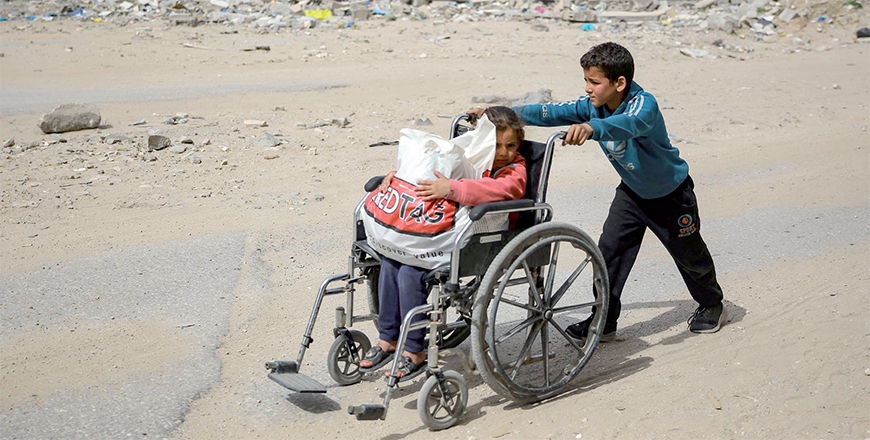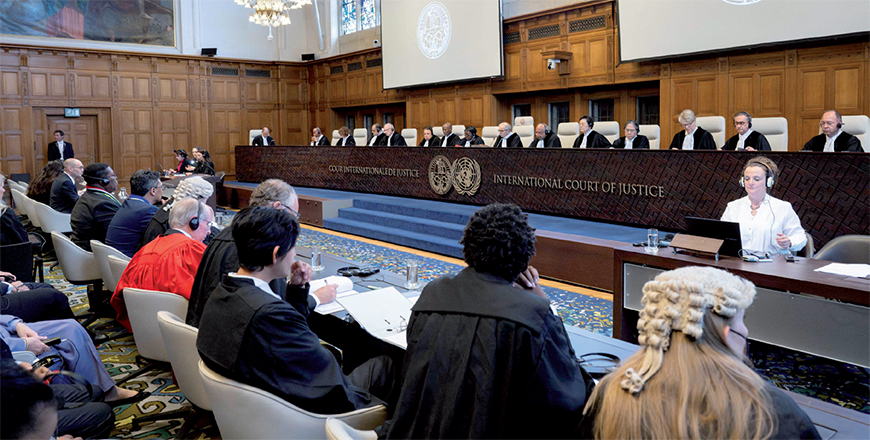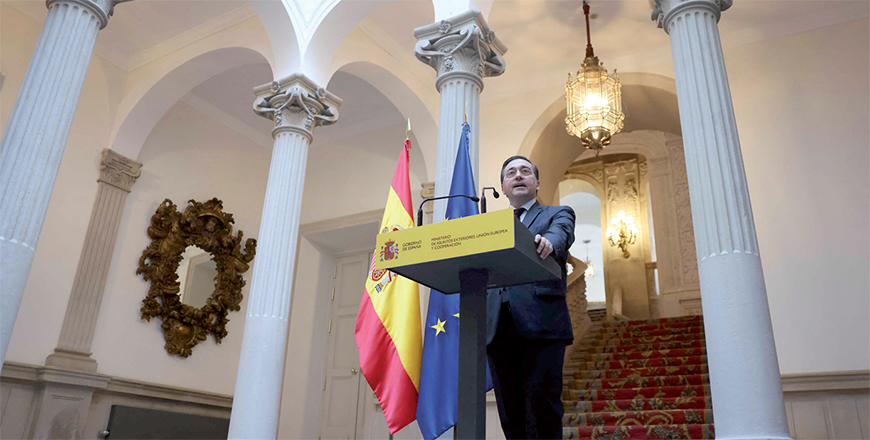You are here
Israel must 'ensure urgent humanitarian assistance' in Gaza: ICJ
By AFP - Mar 29,2024 - Last updated at Mar 29,2024

A boy pushes a young girl in a wheelchair past a destroyed building in Gaza City on Thursday, amid the ongoing Israeli war against the coastal enclave (AFP photo)
THE HAGUE — The world's top court on Thursday ordered Israel to "ensure urgent humanitarian assistance" in Gaza without delay, saying "famine has set in".
The International Court of Justice's latest order comes as heavy street battles continued to rage in besieged Gaza — and a major medical charity said it "hasn't seen any change" since a United Nations Security Council resolution this week demanding an immediate ceasefire.
"Israel shall... take all necessary and effective measures to ensure, without delay... the unhindered provision... of urgently needed basic services and humanitarian assistance" in Gaza, the ICJ said.
"Palestinians in Gaza are no longer facing only a risk of famine, but... famine is setting in," the Hague-based court said.
The war erupted after Hamas's unprecedented attack on Israel from Gaza on October 7. Israel's retaliatory campaign has killed at least 32,552 people, mostly women and children, according to the health ministry in Hamas-run Gaza.
'Dying of starvation'
At the ICJ, South Africa has charged that Israel is perpetrating a genocide in Gaza, an accusation strongly denied by Israel.
Pretoria dragged Israel before the court, saying it was in breach of its obligations under the 1948 UN Genocide Convention, and urging the court to order a ceasefire.
In a ruling in mid-January that made headlines worldwide, the ICJ ordered Israel to do everything it could to prevent genocide during its Gaza offensive.
The court also ruled that Israel must allow aid into Gaza to ease the desperate humanitarian situation there.
South Africa followed up with a request for fresh measures a few weeks later, citing an announced incursion into the city of Rafah, but the court declined to impose additional measures.
Undeterred, Pretoria tried again — this time urging the court to impose emergency measures to “save the Palestinian people in Gaza already dying of starvation”.
Israel said in its defence that South Africa was “engaged in an abusive exploitation of the court’s procedures”.
But the ICJ’s judges said Thursday that the mid-January rulings “do not fully address the consequences arising from the changes in the situation... thus justifying the modification of these measures”.
Pretoria hailed the latest ICJ decision, calling it “significant”.
“The fact that Palestinian deaths are not solely caused by bombardment and ground attacks, but also by disease and starvation, indicates a need to protect the group’s right to exist,” it said in a statement.
‘Unhindered humanitarian aid’
Meanwhile, street battles raged Thursday near a hospital in Gaza, with the humanitarian crisis and surging death toll causing tensions between Israel and top ally the United States.
Tensions flared after Washington on Monday allowed the UN Security Council to pass its first-ever resolution calling for an “immediate ceasefire” and hostage release in Gaza by abstaining from the vote.
Israeli prime minister Benjamin Netanyahu charged that the step by the United States, which had vetoed previous similar demands, served to embolden Israel’s enemy Hamas.
The MSF medical charity said Thursday there was no change on the ground since the Security Council resolution.
What was needed was an immediate and lasting ceasefire, a halt to all attacks on medical installations and personnel, and “unhindered humanitarian aid in Gaza”, MSF’s international president Christos Christou told AFP.
While the war has turned much of the territory into a devastated wasteland of collapsed buildings and tank tracks, Israel has also imposed a siege on its 2.4 million people, eased only by occasional aid deliveries.
The UN has warned that famine “is ever closer to becoming a reality in northern Gaza” and said Gaza’s health system is collapsing “due to ongoing hostilities and access constraints”.
The ICJ was set up to rule on disputes between states and while its judgements are legally binding, it has little means to enforce them.
For example, the court has ordered Russia to halt its invasion of Ukraine, to no avail.
Related Articles
THE HAGUE — South Africa accused Israel Thursday at the top UN court of stepping up what it called a "genocide" in Gaza, urging judges to or
MADRID — Spain said on Thursday that it will join South Africa's case at the UN's top court in which Pretoria has accused Israel of "genocid
THE HAGUE — The UN's top court said it would hand down its landmark ruling on Friday in the case against Israel over alleged genocide in Gaz














